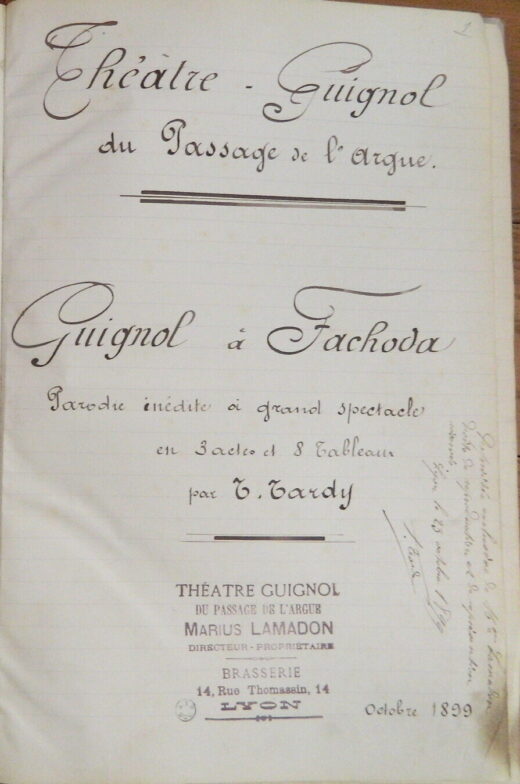
Manuscript
264 pages
Guignol à Fachoda
The topic of the play was inspired by historical events – the Marchand Mission (a military and exploratory mission by the French in central Africa), the Fashoda War (Fashoda being a military base on the Nile, captured by Jean-Baptiste Marchand in June 1898) and the Fashoda Incident (a diplomatic crisis between France and the United Kingdom). The characters include Marchand himself and Horatio Herbert Kitchener, the Sirdar of the Egyptian Army, who was tasked by the British with fighting off any foreign invasion in the Upper Nile. Kitchener and Marchand’s meeting in September 1898 is mentioned at the end of the play. Tony Tardy decided to end the play on this event, even though the outcome of the meeting was already known at the time: the French had to yield to the British’s demands and leave Fashoda.
In keeping with ideological concerns of the time, one of the central themes of the play is the question of “race” – and more specifically of the identity of colonised Africans. This explains why the Senegalese Tirailleur Baissou does not identify as a “black negro”, but rather as a “French soldier” (the Senegalese Tirailleurs were an army corps belonging to the French colonial troops).
The protagonist overcomes obstacles and prevails
Sir William comes to Guignol to suggest that he and Gnafron go sell pills and polish in Africa. The pills would whiten black people’s skins, and the polish would keep intact the skin colour of everyone who would like to stay black. The two friends accept, unaware that the commercial journey is a cover for the true mission, which is to stop captain Marchand from reaching Fashoda. They are joined by doctor Béziclier, who studies races, and his daughter Luce.
In Africa, Gnafron’s business is not going well—nobody wants to buy the pills. On the other hand, Guignol’s polish sells very well. Guignol and Luce are in love, but Béziclier has already promised his daughter to their guide Friponi, who actually works for the British. Yet, the Italian man does not love Luce, who is only a means to his ends. With the help of Bétéké and his companions, he kidnaps Luce and Naora, the slave who travels with her. Friponi then brings the bad news to the doctor and to Guignol and Gnafron, and then goes to the two women’s “rescue”. He makes Korouto, the king of Bangala, believe that the French plan to “slaughter everyone and wipe everything out” and that he himself – Friponi – can prevent that from happening. To do so, he will need Korouto’s army, which the king agrees to lend him. Because the Italian does not need Luce, the king suggests that she be proposed to Joudochik, the king of a neighbouring land.
Naora is in fact Korouto’s daughter. She explains to her father that the French have come to trade – not to wage war – and that Friponi is the real villain. The king understands that he was mistaken and decides to help the French find Luce. Joudochik is willing to give Luce back to Guignol, if she does not curse him. Luce agrees and promises him prosperity instead.
Friponi understands that he has to stop the French on his own, and so he sets the forest on fire. Guignol and Gnafron catch and then kill him. Guignol and his friends arrive at Fashoda and befriend the Mahdi – the leader of the Soudanese people. Major Marchand announces that the Congo-Nile road has been drawn. Sirdar Kitchener, an English officer, contests it: Khartoum and Fashoda are theirs. The Major says that his soldiers would rather die than retreat, so the English pulls back in the end. The French have won Fashoda.
First performance
Théâtre Guignol du Passage de l'Argue